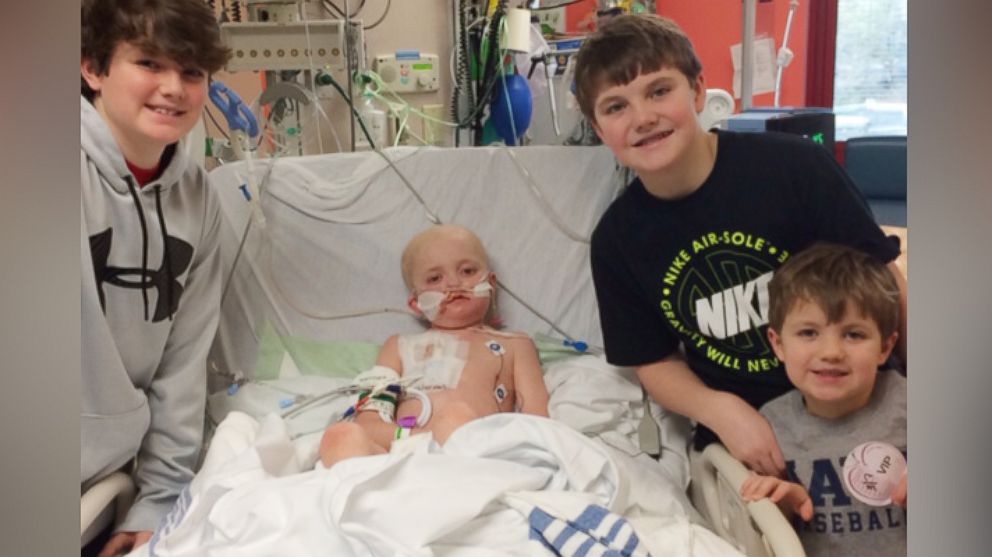Push to Get Experimental Drugs With Social Media Pressure on the Rise
April 2, 2014— -- For a growing number of gravely ill patients running out of options, social media has become their last bastion of hope. And they're sharing their private struggles to motivate public action.
A young newlywed woman smiles for a blog photo despite obvious signs of illness: a cannula in her nose, and a bald head. A group of doctors pose in their scrubs holding signs bearing hashtags to support a sick teen. A small, shirtless boy looks out at a camera with medical tape stuck to his chest and wires sticking out of his arms as his parents snap a picture.
They are dying. They are running out of time to get experimental drugs. And they want you to know who they are.
When patients don’t qualify for clinical trials to get experimental drugs, they try to get them via compassionate use programs, meaning they can take the drugs on their own with their doctor’s oversight and approval from the U.S. Food and Drug Administration. But when drug companies won’t give patients the drugs, patients and their families are increasingly taking their fights to Change.org in the hopes of garnering enough attention to change the minds of drug companies.
In one recent petition, Danielle Grimbilas wrote that she was inspired to go on Change.org because she’d seen another campaign for 25-year-old Mikaela Knapp, whose story has been featured on ABC News' "Good Morning America" and in a dozen other outlets, and that she was hoping to piggyback off of the publicity to get the same drug for her brother, Bryan Cadigan.
“The doctors have not heard back from Merck and his time is running out,” Grimbilas wrote in the petition. “I thought with the media exposure we are seeing around access to this drug maybe a united front would help our cause.”
Neither of Knapp nor Cadigan have swayed the drug company yet.
The compassionate use petitions haven’t been particularly successful, according to Change.org spokesman Tim Newman, relaying the findings of an analysis conducted by site engineers at the request of ABC News.
Read about how Merck expanded access to its drug too late for a Denver dad.
In fact, of the 55 compassionate use petitions on Change.org since 2009, only one has officially declared victory: the petition for 8-year-old Josh Hardy three weeks ago.
Chimerix, a small North Carolina drug company, initially refused to give Josh a drug to fight the adenovirus that was killing him, but then the company changed its mind a few days later. After getting the drug, Josh was moved out of the intensive care unit and his mother blogged that the virus is “undetectable” in his blood.
“It absolutely encourages more requests,” said NYU Langone bioethicist Art Caplan. “I have one [petition] already sent to me to ask for my help.”
Change.org is on track to have more compassionate use petitions this year than ever, with seven new petitions since Jan. 1. Last year, there were 20 compassionate use petitions on the site compared with just three in 2009. In 2013, each of these petitions got about 47,000 signatures on average compared to just 296 signatures per petition on average in 2009.
Compassionate use petitions make up only a tiny portion of Change.org’s health petitions, which numbered 11,138 in the site's history, garnering nearly 21 million signatures and 325 victories, Newman said.
Compassionate use can occasionally hurt a company’s ability to bring a drug to market quickly, slowing the process by diverting the drug itself, resources and time, experts said. If a patient dies while taking the experimental drug under compassionate use –- even of unrelated causes -- it may slow down the approval process for a drug because the company has to prove that the drug didn’t contribute to the patient’s death.
“Compassionate use often fails,” NYU's Caplan noted. “It is not due to the drug –- just that the drug frequently does not cure.”
The alternative for these patients is often death, so they fight for access to the experimental drugs because they want to know they did everything they could.
"I have been given a zero chance of survival past the next few months without this drug," Change.org petitioner Nick Auden told ABCNews.com in an email last October.
Auden’s campaign was one of the most successful compassionate use campaigns on Change.org, gathering more than half a million signatures to convince Merck or Bristol-Myers Squibb to give him access to their breakthrough cancer drug. His wife came up with the idea to post a video of Auden playing with their young children to drum up support, and they named it the “Save Locky’s Dad” campaign for their oldest son, Locky, 7.
"I want my dad to get the PD-1 drug because then I can do the things I like to do with him all the time," Locky says in the video, flashing a smile that's missing two front teeth.
Merck eventually expanded access to its drug to other melanoma patients this month, but it was too late for Auden.
He died at home in November.




